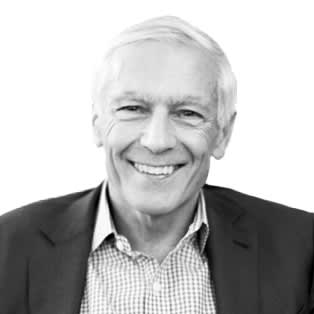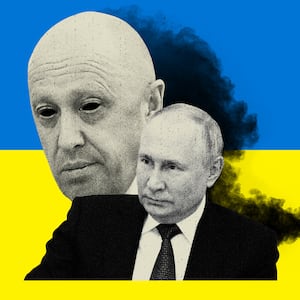Was it merely revenge? A warning to others? Though his death is still to be officially confirmed, Yevgeny Prigozhin has likely met the fate of so many before him who have danced with Putin and lost his trust. But there may also be far more to the story, and no doubt more to be revealed. For its part, the Kremlin Friday denied that Vladimir Putin had ordered Prigozhin’s assassination—spokesperson Dmitry Peskov called such speculation “an absolute lie.”
If Prigozhin’s initial “March on Moscow” was indeed a hastily planned spasm of anger at the Russian military, why wasn’t it stopped immediately? Could there have been some intent by “the center” to let it play out enough to identify and sweep up others of dubious loyalty, or was it truly a counter-intelligence failure at the highest levels? And if so, will some others, who should have detected his preparations but failed to do so, quietly disappear?
Had Prigozhin sensed that his rising popularity had already made him a target? Was he manipulated by someone close to Putin to make his move—and then, before being eliminated, used to enable Russia to deploy more forces into Belarus and rope Belorussian dictator Lukashenko into greater support for Putin’s war?
ADVERTISEMENT
While we don’t know the inner workings behind the drama, we must be cautious in proclaiming discord and weakness inside Putin’s leadership circle. Putin has modeled his wartime leadership style on World War II Soviet leader Joseph Stalin: Every protest or dissent is used to identify ”enemies” and tighten control. He has arrested demonstrators, dampened the anguish of grieving mothers, eliminated oligarchs, tightened laws against dissent, and re-engineered even greater punishment for his leading political Russian opponent, Alexei Navalny.
Putin has maintained control of the information space inside Russia, blocking news and communications with the West. He has wrapped himself in the Russian language of sacrifice and patriotism, and he has maintained the support of the vast majority of the Russian people. Unlike former Soviet leader Mikhail Gorbachev, he has thus far succeeded in evoking the deepest Russian feelings of pride, resistance, and resilience in the face of staggering casualties on the battlefield. Putin has no doubt been scheming and struggling to open a northern attack from Belarus against Ukraine, to break supply lines to the West and isolate Kyiv. The Prigozhin caper may turn out to have helped him advance this effort.

Russian businessman Yevgeny Prigozhin looks on before a meeting of Russian President Vladimir Putin and his Chinese counterpart Xi Jinping with representatives of civic organizations, business and media communities at the Kremlin in Moscow, Russia July 4, 2017.
REUTERS/Sergei Ilnitsky/Pool/File PhotoPutin prides himself in his excellence in Jiu-Jitsu—using his opponent’s momentum against him. While it may be—may be—true that the Prigozhin affair exposed a certain crack in Putin’s day-to-day control of events, he has nevertheless shown himself capable of “Jiu-Jitsu” at the highest levels.
In the West we too often imagine our opponents are “mirror images” of ourselves—we must not make this mistake with Putin. He is cunning, remorseless, and relentlessly determined to regain control of Ukraine—to the extent of eradicating a people and their culture. The deaths of hundreds or thousands mean little to him. He doesn’t honor agreements, respect laws and customs, or accept any restraint on his actions, unless it temporarily advances his purpose. He seems to view himself as at war with the West, with NATO and the United States, in which crushing Ukraine is merely the first stage. He has said this openly and repeatedly. We’ve been reluctant to acknowledge this.
Putin, on the other hand, must be looking at the U.S. political scene, as well as politics in Germany and elsewhere in the West, and seeing vulnerabilities and weaknesses in our support for Ukraine. The conflict in Ukraine will end when Putin decides he can’t win. The Prigozhin affair should underscore the nature of Putin, and warn us that we must avoid wishful thinking and take him ever more seriously.







